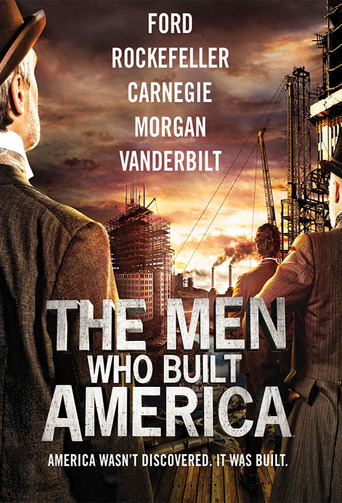

Some scenes show (quite naturally)trains running through the countryside. Problem is they are modern British Trains running through mostly Scottish countryside. The image hardly fits with stories about Vanderbilt. Again with Carnegie, during his great strike initiated by Clay Frick, we are shown Andrew Carnegie as being in Dunfermiline, Scotland at that time. Indeed, he was in Scotland, but NOT Dunfermile. He was in Skibo Castle about 250 miles NORTH of Dunfermline, and more out of touch with Pittsburgh than is suggested. Also, Dunfermline is portrayed as a tiny fishing village in a sleepy little seaside scene. This is also very wrong. My point is, if History channel got the simple basics wrong, how can I believe the other, more significant facts. My overall impression of this series was that some basic facts were correct, but the entire story was not. In all, a poorly done show and well beneath the ability and competence of The History Channel and those who created the video.
... View MoreAlthough I am not a history major or a self-proclaimed history buff, I loved this show. I normally NEVER watch TV and I simply couldn't stop until I was done with the series. I thought the producers did an excellent job of making these stories interesting and I also enjoyed the commentary. The men portrayed, (Vanderbuilt, Rockefeller, Carnegie, J.P. Morgan, and Ford) were business geniuses regardless of their often unscrupulous tactics amongst each other, smaller business and the working man. It's still a part of American history that everyone should learn about, including kids in school. Also, it's much better than most shows you find on TV these days.
... View MoreA bio of the 5 men who built America would have been more interesting had they concentrated on the men themselves instead of the vast sums of money they made. And the interviews with modern money makers simply made it a greed is good promotion. To hear time after time that these men were not about the money is simply stupefying as that is what it was all about. And in order to show how powerful these men were they were given a monetary figure to show it and then another to show how much they would be worth now. It seems to me that the modern "captains of industry" (Jesus what a self promoting piece of shite that term is) hanker back to a time of these moguls could trample over every right and every law just to make money. It seems like they are still trying to get back to those time with the export of industry to countries like Pakistan and others who little or no workers rights and pay their workers the same wages Rockerfeller and their ilk did in their time. One of the most disgusting things about these modern moneymakers is the way they admire the underhand things of the past. Take the time when these moguls threatened to shut down their factories and put their workers on the breadline if they did not vote for McKinley.Seem to remember Thrump and others saying the same thing if Obama got elected. They refer to the scramble to make money as a game. A game played with workers rights, votes and indeed their very lives. And they want to get back to this time. A time when the Wall Street gurriers can wreck what they want and watch from mansions on high as the rest of us drown in the floods that follow. History does repeat itself unless we learn from the mistakes and praising these men for greed is simply playing into the hands of those who want to go back to the time of JP Morgan, Carnaghie and the rest.
... View MoreOverall I found this to be an entertaining look at the history of the robber barons and how the US economy (and in the long run the world economy) evolved during the last half of the 19th century.The mix of interviews and commentary with actors portraying the historical figures was effective.I did have a minor problem with some of the historical errors. For example in one scene they show the magnates viewing a film of William Jennings Bryan and the commentary is to the effect that he is "certain to be the Democratic nominee.In fact there was no real front runner in 1896 and Bryan emerged as something of a surprise nominee following his famous Cross of Gold Speech But overall an entertaining series
... View More